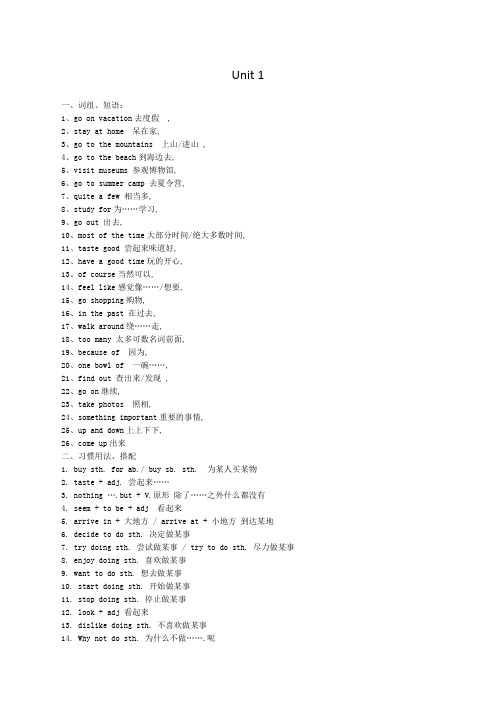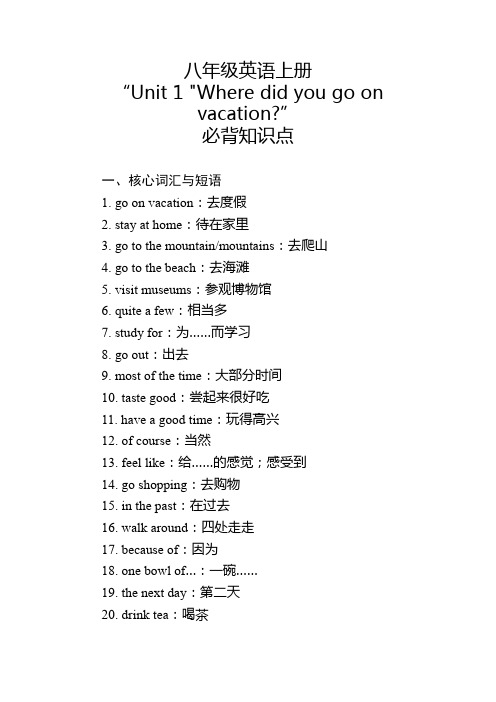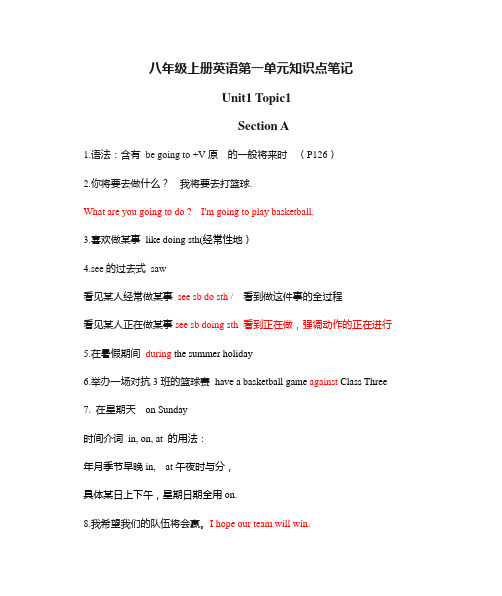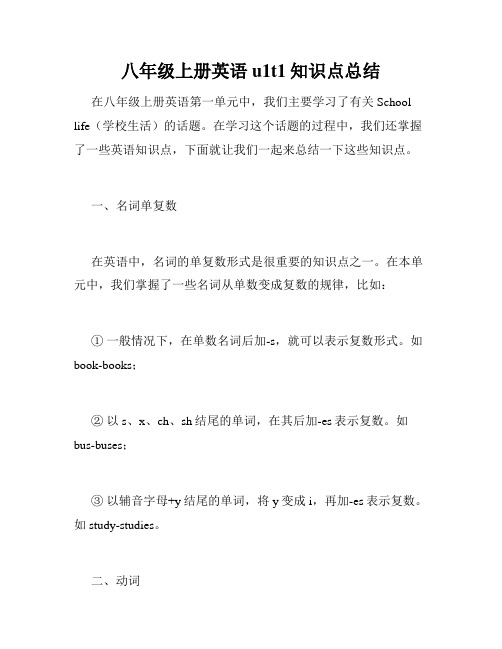八年级英语上册第一单元知识点总结
八年级上册第一单元英语知识点

八年级上册第一单元英语知识点八年级上册第一单元是初中英语课程中的开端,这一单元主要介绍英语语法、词汇和听、说、读、写四个方面的能力。
这篇文章将会从这些方面详细讲解八年级上册第一单元的英语知识点。
一、语法知识点1. 动词时态:在八年级上册第一单元中,学生将会学习到不同的动词时态,如一般现在时、一般过去时、现在进行时、现在完成时等。
2. 形容词和副词的比较级和最高级:比较级和最高级的用法是比较难掌握的,在这个单元,学生们要学习到不同的规则,如单音节词比较级加“-er”、最高级加“-est”;以“e”结尾的词比较级加“-r”、最高级加“-st”等。
3. 宾语从句和定语从句:学生们也将会学习到宾语从句和定语从句的用法和区别。
宾语从句在句子中作为宾语,定语从句在句子中修饰主语或宾语。
二、词汇知识点1. 词汇量扩大:在八年级上册第一单元中,学生的词汇量将会有显著的扩大。
主要包括前缀、后缀、词根和派生词等。
2. 重点词汇:此外,在八年级上册第一单元中,学生们还要掌握一些常用的重点词汇,如weather、funny、homework、project、music等。
三、听、说、读、写四个方面的能力1. 听力:八年级上册第一单元的听力有两部分,第一部分是短对话,主要测试学生对于日常生活对话的理解;第二部分是长对话,主要考察学生对于更加复杂的对话和信息的理解。
2. 口语:在八年级上册第一单元中,学生们开始采用更加自由的交流方式,例如小组讨论、对话等。
这对于学生的口语能力有非常大的帮助。
3. 阅读:除了教材中提供的一些短文、新闻和故事以外,老师也会引入更加广泛的阅读材料,这有助于学生增加词汇量、理解能力和阅读技能。
4. 写作:在这一单元中,学生们将会开始正式的写作训练,学会如何组织合适的内容和语言形式。
主要包括短文、日记、书信等写作形式。
结语:八年级上册第一单元是英语学习中非常重要和基础的一步。
对于这些知识点的掌握和应用可以让学生更好的在英语学习中取得进步。
八年级上册英语unit1知识点

八年级上册英语unit1知识点八年级上册英语的第一单元主要涉及到如何介绍自己和谈论家庭成员。
在这个单元中,涉及到很多的语法和单词。
在这篇文章中,我们将对这些知识点进行详细的探讨和分析。
一、语法1. To be 动词在这个单元中,我们首先需要学习的是to be。
to be是一种非常基础的语法形式,用来表示一个人或者事物的状态和特点。
当我们要介绍自己或者其他人时,to be是一个非常常用的动词。
例如:- My name is Lily.我叫莉莉。
- He is my brother.他是我的兄弟。
2. 人称代词人称代词也是这个单元中需要学习的一个重要知识点。
人称代词是用来代替人名的一种词语,用来简化句子结构。
例如:- I am a student.我是一名学生。
- She is happy.她很开心。
- They are our friends.他们是我们的朋友。
3. 形容词形容词是用来描述人或事物特点的一种词语。
在这个单元中,我们需要学习一些常见的形容词,如happy、smart、young等等。
例如:- She is smart.她很聪明。
- He is young.他很年轻。
- I am happy.我很开心。
4. 名词名词也是这个单元中需要学习的一个重要知识点。
名词是用来表示人、事物、地点或者概念的一种词语。
通常情况下,名词在句子中作为主语、宾语或补语。
例如:- My father is a teacher.我父亲是一名老师。
- Beijing is the capital of China.北京是中国的首都。
- English is an important language.英语是一种重要的语言。
二、单词1. 人称代词人称代词是to be动词和其他动词中最常使用的一种词语。
在介绍自己或者其他人时非常常用。
例如:- My name is Tom.我叫汤姆。
- She is my sister.她是我的姐姐。
八年级英语上册第一单元语法知识点归纳

Unit 1一、词组、短语:1、go on vacation去度假 ,2、stay at home 呆在家,3、go to the mountains 上山/进山 ,4、go to the beach到海边去,5、visit museums 参观博物馆,6、go to summer camp 去夏令营,7、quite a few 相当多,8、study for为……学习,9、go out 出去,10、most of the time大部分时间/绝大多数时间,11、taste good 尝起来味道好,12、have a good time玩的开心,13、of course当然可以,14、feel like感觉像……/想要,15、go shopping购物,16、in the past 在过去,17、walk around绕……走,18、too many 太多可数名词前面,19、because of 因为,20、one bowl of 一碗……,21、find out 查出来/发现 ,22、go on继续,23、take photos 照相,24、something important重要的事情,25、up and down上上下下,26、come up出来二、习惯用法、搭配1. buy sth. for ab./ buy sb. sth. 为某人买某物2. taste + adj. 尝起来……3. nothing ….but + V.原形除了……之外什么都没有4. seem + to be + adj 看起来5. arrive in + 大地方 / arrive at + 小地方到达某地6. decide to do sth. 决定做某事7. try doing sth. 尝试做某事 / try to do sth. 尽力做某事8. enjoy doing sth. 喜欢做某事9. want to do sth. 想去做某事10. start doing sth. 开始做某事11. stop doing sth. 停止做某事12. look + adj 看起来13. dislike doing sth. 不喜欢做某事14. Why not do sth. 为什么不做…….呢15. so + adj + that + 从句如此……以至于……16. tell sb. not to do sth. 告诉某人不要做某事17. keep doing sth. 继续做某事18. forget to do sth. 忘记去做某事 / forget doing sth 忘记做过某事三、重点句子1. Where did you go on vacation 你去哪儿度假的1这是一个由疑问副词where引导的特殊疑问句;Where用来询问地点或场所,用于句首,其后跟一般疑问句;如:Where are you from Where does he live2go on vacation“去度假”He will go on vacation with his family. 他要和家人一起度假;解析 vacation v'ken n 假期 = holidayon vacation 在度假 take a vacation 去度假 winter vacation 寒假 summer vacation 暑假①I have a lot of _______________every year . vacation②— Where did Sarah go on vacation— She went to America.A.on vacationB. take a vacationC. is on vacationD. is for vacation2、Did you go with anyone你和别人一起去的吗这是一个一般过去时的一般疑问句;当含有实义动词的一般过去时的陈述句变为一般疑问句时,需借助助动词did,此时后面的实义动词应用原形;其句型结构为“did+主语+动词原形+其它”,肯定回答为“Yes,主语+did”,否定回答为“No,主语+didn′t”·基本用法pron. anyone 任何人,相当于anybody,通常用在否定句、疑问句或条件从句中;如: I wont tell anyone I saw you here. 我不会告诉任何人我在这儿见过你;Why would anyone want that job 为什么会有人想要那份工作呢知识拓展---同类词Some - any- no- every-指人 someone 有人 anyone 任何人 anybody no one 没有人nobody everyone 人人 everybody指物 something 某物 anything 任何事 nothing 没有事everything 一切事指地点 somewhere 某地 anywhere 任何地方 nowhere 无处,没有地方 everywhere 到处注意:1由some-, any-, no-, every-构成的符合不定代词作主语时,都作单数看待,其谓语动词用第三人称单数形式;2不定代词若有定语修饰,该定语要置于其后,作后置定语;如:Id like something to drink. 我想要些喝的;Is there anything interesting in the book 这本书中有有趣的东西吗小结:解析1someone smwn pron 某人anyone eniwn pron 任何人 everyone evriwn pron 每人,人人 my uncle 看望了我的叔叔visit是及物动词,意为“拜访;探望”,后接表示人的名词或代词; visit还可以意为“参观;游览”,后接表示地点的名词;a.I visited my grandmother last week. 上周我去______了我的外婆;b. you want to visit Shanghai 你想______上海吗c.拓展:visitor意为“参观者;游客”;These visitors come fromanything special 买特别的东西;P21buy及物动词,意为“买;购买”;其过去式为______;拓展:buy sth. for sb.=buy sb. sth. 意为“给某人买某物”; My uncle_____ _____a bike.= My uncle_____ _____for me.2)anything不定代词,意为“某事;某件东西”,主要用于疑问句或否定句中;a.Do you want to buy anything for me cant say anything about it.3)anthing special表示“特别的东西”,形容词修饰不定代词时后置;Is there________ ________in this book这本书里有新的内容吗, did you go anywhere interesting哦,你去有趣的地方了吗P21本句是did开头的一般疑问句2anywhere用作副词,意为“在任何地方”;eg:Did you go anywhere during the summer vacation 辨析:anywhere与somewhereanywhere意为“在任何地方”,常用于否定句和疑问句中; eg:I cant find it anywhere.somewhere意为“在某处;到某处”,常用于肯定句中; eg:I lost my key somewhere near here. took quite a few photos there.我们在那里拍了不少照片;P2take photos 意为“照相;拍照”; eg:We______ ______on the Great Wall.我们在长城上照了相;辨析:quite a few与quite a littlequite a few 意为“很多;不少”,修饰可数名词复数;quite a little 意为“很多;不少”,修饰不可数名词;a. He stays here for _____ _____ _____days.is _____ _____ _____water in the bottle瓶子.6. I just stayed at home most of the time to read and relax. 我大部分时间只是待在家里读书休息; P2most of the time意为“大部分时间”,其中most为代词,意为“大部分;大多数”拓展most of…意为“……中的大多数”,它作主语时,谓语动词取决于most of后所修饰的名词;of us_____begoing to the park. 我们大多数人要去公园;b. Most of the food_____gobad. 大部分的食物都变质了;7.Everything tasted really good所有的东西尝起来真的很好吃P3taste在此为系动词,意为“尝起来”,其后接形容词构成系表结构;a.The food tastes really great.食物尝起来棒极了;8. Did everyone have a good time大家都玩得很开心吗P3have a good time = enjoy oneself = have fun 玩得开心 + doingeg: We had a good time visiting the the Great Wall. = We enjoyed ourselves visiting the the Great Wall.= We had fun visiting the the Great Wall.did you like it 你觉得它怎么样P3How do/did you like……意为“你觉得……怎么样”,用来询问对方的观点或看法,相当What do you think of……eg: How do you like your new job = _____ _____ _____ _____ your new jobyou go shopping 你们去购物了吗P3go shopping意为“去购物;去买东西”,同义短语为do some shopping.eg: I usually go shopping on Sundays.我通常星期天去购物;拓展:“go+doing”形式表示“去做某事”,常用于表达从事某一体育活动或休闲活动;go skating 去滑冰go hiking 去远足 go sightseeing 去观光 go fishing 去钓鱼 go swimming 去游泳go boating 去划船went to a friends farm in the countryside with my family.我和家人一起去了乡下一个朋友的农场;P3a friend’s farm是名词所有格形式;一般情况下,表示“有生命的人或物”的名词后面加s,表示所属关系;eg:The red bike is Alices. 那辆红色的自行车是爱丽斯的;拓展:名词所有格的构成:1单数名词词尾加s ,复数名词词尾没有s,也要加sthe girl ‘s pen女孩的钢笔 women’s shoes女鞋 on Children’s Day2复数名词以s结尾的只加the students’ reading room学生阅览室 Teachers’ Day教师节3如果两个名词并列,并且分别有s,则表示“分别有”;只后一个名词有一个s,则表示“共有”:John’s and Kate’s rooms. 约翰和凯特各自的房间; Lily and Lucy’s father. 莉莉和露西的爸爸同一个爸爸; 4表示无生命的名词一般以...of...构成短语,表示所有关系;a map of China一幅中国地图 the name of the story那个故事的名字12.Still no one seemed to be bored. 即使这样仍然没有人看起来无聊;P31seem意为“好像;似乎;看来”;eg:Everything seems easy.一切似乎很容易;拓展 a. seem+adj. “看起来……”; You seem happy today.你今天看起来很高兴;b. seem+to do sth. “似乎,好像做某事”; I seem to have a cold.我似乎感冒了;=It seems that I have a cold.c. It seems/seemed+从句“看起来好像…;似乎…”;It seems that no one believes you.看起来好像没有人相信2辨析:bored与boringa. bored意为“厌烦的;感到无聊的”,一般在句中修饰人;b. boring意为“无聊的;令人厌烦的”,一般在句中修饰事或物;eg:a. I’m ______with what he said.我对他说的话厌烦极了;b. I find the story very_______.我发现这个故事太无聊了;二Section B1. What activities do you find enjoyable 你发现什么活动让人快乐P5enjoyable形容词,意为“愉快的;快乐的”;Im sure we will have an enjoyable vacation. 我确信我们将会有一个愉快的假期;2. I arrived in Penang in Malaysia this morning with my family. 今天早上我和家人到达了马来西亚的槟城;P5arrive不及物动词,意为“到达”;arrive in表示到达较大的地方,如国家、省、市等;arrive at表示到达较小的地方,如机场、商店、广场、村庄等;注:地点副词home,here,there前介词省略辨析:①arrive in+大地点 / arrive at+小地点②get to +地点③reach+地点eg:I 到达 school at 8:00 oclock yesterday.3. …so we decided to go to the beach near our hotel…因此我们决定到旅馆附近的海滩上去;P5 decide to do sth.意为“决定做某事”; eg: They _____ ______ ______the museum.他们决定去参观博物馆;拓展:decide后常跟“疑问词+动词不定式”做宾语;He can’t decide when ______ _____leave 他不能决定何时动身;4. My sister and I tried paragliding.姐姐和我尝试了滑翔伞运动;P5try此处用作及物动词,其后常接名词、动名词或不定式,意为“尝试;试图,设法;努力”She is trying my bicycle.她正在试骑我的自行车;拓展:try也可用作名词,意为“尝试”,常用短语“have a try”,意为“试一试”;I want to have a try.我想试一试;辨析:try doing sth. / try to do sth.1try doing sth. 尝试做某事,表示一种尝试、做做看的想法,不一定付出很多努力;2try to do sth.尽力、设法去做某事,表示想尽一切办法要把事情办成,强调付出努力设法去完成;a. I ______ ______ him, but no one answered. 我试着给他打电话了,但没有人接听;b. Im ______ ______ ______ English well. 我正尽力把英语学好;5. I felt like I was a bird. It was so exciting 我感觉自己就像一只小鸟;太刺激了P51feel like意为“给……的感觉;感受到”;其后常接从句; eg: He feels like he is swimming. 他感觉像在游泳一样;拓展:feel like还可意为“想要……”,其后可接名词、代词或动名词;即: feel like sth. 想要某物 feel like doing sth. 想要做某事 eg:Do you feel like a cup of tea now 你现在想要一杯茶吗Do you feel like ______ take a walk in the park with me 你想跟我在公园散步吗2辨析:exciting与excitedexciting 意为“令人兴奋的,使人激动的”, 一般修饰某物; excited 意为“感到兴奋的,激动的”, 一般修饰某人; Eg: story is_________exciting, excited .told me the_______exciting, excitednews.was_______exciting, excitedto see the singer.6.There are a lot of new buildings now…现在有许多新的建筑物……P5building 可数名词,意为“建筑物;楼房”;build 动词,“建造,建筑” built,built,The workers built many tall buildings in our school last year.7. I wonder what life was like here in the past. 我想知道在这儿过去的生活是什么样的;P5 wonder此处是及物动词,意为“想知道;琢磨”;其后常接who, what, why等疑问词引导的宾语从句;Eg: wonder _______________. 我想知道那个男孩是谁;A. the boy is who B. who the boy is 2. I wonder what they were doing here.我想知道他去哪里了;8.I really enjoyed walking around the town. 我真的很喜欢在镇上到处走走; P51enjoy及物动词,意为“喜爱;欣赏;享受……的乐趣”,其后接名词,代词或动名词作宾语;a. Do you enjoy your job 你喜欢你的工作吗b. I enjoy reading books. 我喜欢读书;enjoy doing sth.喜欢做某事拓展: enjoy oneself =have a good time = have fun 玩得开心 + doing sth.2)walk around 意为“四处走走”;Hes just walking around the village.他只是在村庄里随便走走;9. What a difference a day makes 一天的变化有多大呀 P5difference可数名词,意为“差别,差异”;其形容词形式为different,意为“不同的;有差异的”; Eg: a. What is the difference between this book and that bookb. My schoolbag is different from yours. be different from 意为“与……不同”10.We wanted to walk up to the top , but then it started raining a little so we decided to take the train.P51want to do sth. 意为“想要做某事”;2start doing sth. 意为“开始做某事”,同义短语:start to do sth. Eg: Tom started learning English last year.3a little 意为“一点儿”,在句中修饰动词、形容词或副词;也可以修饰不可数名词;Eg: a. I can draw a little, but only as a hobby. ______________________________b. Its a little cold outside. ______________________________c. He can speak a little English. ______________________________4)take the train意为“乘火车”,take在此意为“乘坐”;waited over an hour for the train because there were too many people. 因为人太多,所以我们等了一个多小时的火车;P51wait for意为“等候”,其后可接人或物; Tom was waiting for a bus over there.2over介词,意为“多于;超过” ,相当于more than; Eg : My father is over 40 years old.Here are over eight hundred students in our school.3 too many意为“太多”,其后接可数名词复数; He always has too many questions to ask me. 辨析:too many + 可数名词复数意为“太多... ”too much + 不可数名词意为“太多... ”much too + 形容词 /副词意为“太... ”eg:I have homework to do today. The weather today is ______ _______ cold. because of the bad weather, we couldnt see anything below.而且因为坏天气,我们也没能看到下面的任何景色P5辨析:because of与becausea. because of意为“因为,由于”,后可接名词短语、代词或动名词,不能接句子; He lost his job because of his age.b. because意为“因为”,引导状语从句,即接句子; I didnt buy the shirt because it was too expensive.13.My father didnt bring enough money…我爸爸没带足够的钱……P51辨析:bring与takebring意为“带来;拿来”, 指从别处带到说话者所在地;take意为“拿走;带走”, 指从说话者所在地带到别处去;2enough 意为“足够的,充分的”1.用来修饰形容词或副词,一般置于被修饰词之后;2.用来修饰名词时放在名词之前;Eg:a. We have enough time to do our homework.b. The box is big enough.14.…because we forgot to bring an umbrella…因为我们忘了带雨伞;P6辨析:forget to do sth.与forget doing sth.forget to do sth. 意为“忘记要做某事事情还没做”eg: Dont forget to close the window. forget doing sth. 意为“忘记做过某事事情已经做过了” eg: I forget closing the window. 15. About one hour later, we stopped and drank some tea. 大约一小时后,我们停下来喝了些茶;P6 1one hour later 一小时后;一小时前__________________2stop动词,意为“停止;中断”,过去式_________,现在分词__________;3drink及物动词,意为“喝;饮”;还可以作名词,意为“饮料”;16. Did you dislike anything 你不喜欢什么东西吗P7dislike意为“不喜欢;厌恶”,其后可接名词、代词或动名词形式作宾语;Eg:a. Mary ______ the hamburgers. 玛丽不喜欢汉堡包;b. I _____ ______ computer 我不喜欢玩电脑游戏;17. Why not 为什么不带呀P8why not意为“为什么不呢”,一般用在疑问句中,表示提建议;why not后面需跟动词原形;注“Why not + 动词原形”相当于“Why dont you+ 动词原形”a. Why not go to the party with me =Why dont you go to the party with me为什么不和我一起去参加聚会呢_____ take a walk = _____ ______ _____ take a walk 为什么不去散步呢in our class took a bag with some food and water. 我们班上的每一个人都随身带了装有食物和水的提袋;P8with介词,意为“具有;带有”; 此处介词短语with some food and water作bag的后置定语;拓展:with作介词时的其他用法:a.“和……一起’ I often go to school ______ my friend. 我经常和朋友们一起去上学;b. 以手段、材料,用工具, Cut the apple with a knife. 用刀切苹果;19. My legs were so tired that I wanted to stop. 我的双腿太累了以至于我都想停下来;P8so…that… / such…that…如此…以致引导的结果状语从句so+adj./adv.+that…Eg:1. He is ____lovely a boy____we love him very much.2.The little boy is so young that he can’t go to school.20. 常用的感叹句的结构:1What +adj.+ 复数名词 / 不可数名词+主语+谓语2What +a/an+adj.+可数名词单数+主语+谓语3How +adj. +a/an+可数名词单数+主语+谓语4How+adj./adv. +主语+谓语eg: an interesting book it is = How interesting a book is 那本书多么有趣啊clever girl she is3. _____clever a girl she isjobs they have donewater it is D. Howthe dog is C. Where D. How21. My classmates told me to keep going, so I went on. 我的同学告诉我坚持往前走,因此我便继续前进了P81tell sb. notto do sth. 意为“告诉某人不要做某事;The teacher ______ ______ ______ ______ the window just now. 老师刚才告诉我们擦窗户;2keep doing sth. 意为“继续做某事,一直做某事”;She______ ______ TV for two hours last night. 昨晚她持续看了两个小时的电视;23.Everyone jumped up and down in excitement. 大家都兴奋地跳起来;P8up and down 意为“上上下下;来来回回”,在句中作状语;Eg:They looked me ______ ______ ______. 他们上上下下打量我;He walks______ ______ ______ in the room. 他在房间里来回走动;22. 反身代词:myself , ourselves, yourself , yourselves, himself, herself, itself, themselves.作动词或介词的宾语:经常在enjoy, teach, hurt, buy, introduce, dress, kill等动词和by, for, to, of等介词后作宾语;一年主考宾语回自身He is teaching himself English.她在自学英语;She was talking to herself.她自言自语;He lives by himself in the country.他独自住在乡下;1)Help yourself 请随便吃吧/请自己去取吧2)2 Make yourself at home 别客气3)make yourself heard /understood. 使你的话被人听得见/理解4)4 teach oneself 自学=learn by oneself5)5 by oneself 独自6)for oneself 为自己;替自己7 enjoy oneself 玩的愉快8 dress oneself 给自己穿衣, little, a few, a little :的用法few, a few修饰可数名词,little, a little修饰不可数名词;few, little具有否定意义,表示“几乎没有”,a few, a little具有肯定意义,表示“一些”;He has little money, but few students want to lend money to him.他几乎没有钱,但是几乎没有学生想借钱给他;There is a little milk and a few apples left in the fridge.冰箱里还有一些牛奶和一些苹果;。
(完整版)八年级上册第一单元英语语法、短语和知识点总结

八年级上册英语语法、短语和知识点总结Unit 1 Where did you go on vacati on?本单元的话题:谈论假期活动内容,复习一般过去时。
本单元的语法:1.复习一般过去时;2•学习不定代词和不定副词的用法。
语法: 1•本单元出现的动词不规则过去式有:is\am---was 是;are -- were 是;go---went 去;buy —bought买;take ---took拿走;do\does —did 做;feed—fed喂;see —saw看见;eat --ate 吃;have\has —had 有、吃;feel -felt 感觉;ride —rode 骑;get --got 到达,得到;can — could 能、会;forget —forgot 忘记;drink —drank 喝;find —found 找到2. 不定代词和不定副词的用法:some bodyany oneevery thingno where (疑问副词)不定代词和不定副词(1)左边的some、any、every、no 与右边的body、one、thing 构成不定代词,some、any、every、no与右边的疑问副词where 构成不定副词;(2)—般情况下以some开头的不定代词和不定副词用于肯定句,以any开头的不定代词和不定副词用于否定句、疑问句;以no开头的不定代词和不定副词表示否定含义(no one为两个单词);(3)不定代词或不定副词和形容词连用时,形容词放在后面。
He has something important to do. 他有重要的事情要做。
(肯定句用something,形容词important 放后)Did you buy anything special?(一般疑问句用anything,形容词special放后)Did you go any where interesting last mon th? 上个月你去令人感兴趣的地方了吗?(一般疑问句用不定副词anywhere,形容词interesting 放后)(4)不定代词和不定副词做主语时,后面的动词用单数形式。
八年级英语上册第一单元知识点总结

八年级英语上册第一单元知识点总结1. 问候和介绍- 问候语:Hello! / Hi! / How are you?- 介绍语:My name is... / I am...2. 自我介绍- 姓名:My name is...- 年龄:I am... years old.- 家庭:I have... family members.3. 询问和表达兴趣- 询问:What do you like? / What are your hobbies?- 回答:I like... / My hobbies are...4. 日期和时间- 日期:What date is it today? / It's...- 时间:What time is it? / It's...5. 数字和颜色- 数字:Counting from 1 to 10.- 颜色:Red, yellow, blue, green, etc.6. 学校生活- 学科:Subjects like math, English, science, etc.- 教室:Classroom, blackboard, desk, etc.- 研究活动:Study, read, write, listen, speak, etc.7. 家庭成员- 家人:Father, mother, brother, sister, etc.- 关系:My father is... / My mother is...8. 日常活动- 问答:What do you do in the morning/afternoon/evening? - 回答:I... / I usually...9. 问路和指示- 问路:Excuse me, where is the...?- 指示:Go straight, turn left/right, etc.10. 国家和语言- 国家:China, America, England, etc.- 语言:Chinese, English, French, etc.以上是八年级英语上册第一单元的基本知识点总结。
八年级英语上册“Unit 1”必背知识点

八年级英语上册“Unit 1 "Where did you go onvacation?”必背知识点一、核心词汇与短语1. go on vacation:去度假2. stay at home:待在家里3. go to the mountain/mountains:去爬山4. go to the beach:去海滩5. visit museums:参观博物馆6. quite a few:相当多7. study for:为……而学习8. go out:出去9. most of the time:大部分时间10. taste good:尝起来很好吃11. have a good time:玩得高兴12. of course:当然13. feel like:给……的感觉;感受到14. go shopping:去购物15. in the past:在过去16. walk around:四处走走17. because of:因为18. one bowl of…:一碗……19. the next day:第二天20. drink tea:喝茶21. find out:找出;查明22. take photos:照相23. something important:重要的事二、重点句型与结构1. 询问过去的行动:Where did you go on vacation? 你假期去哪里了?What did you do last weekend? 上周末你做了什么?2. 回答过去的行动:I went to the mountains. 我去爬山了。
We visited the museum. 我们参观了博物馆。
3. 描述过去的感受或状态:It was wonderful. 太棒了。
I felt like I was a bird. 我感觉自己像一只鸟。
4. 表示过去的频率或习惯:I usually went shopping with my mom. 我通常和我妈妈一起去购物。
八年级上册英语第一单元知识点笔记

八年级上册英语第一单元知识点笔记Unit1 Topic1Section A1.语法:含有be going to +V原的一般将来时(P126)2.你将要去做什么?我将要去打篮球.What are you going to do ? I'm going to play basketball.3.喜欢做某事like doing sth(经常性地)4.see的过去式saw看见某人经常做某事see sb do sth /看到做这件事的全过程看见某人正在做某事see sb doing sth 看到正在做,强调动作的正在进行5.在暑假期间during the summer holiday6.举办一场对抗3班的篮球赛have a basketball game against Class Three7. 在星期天on Sunday时间介词in, on, at 的用法:年月季节早晚in, at午夜时与分,具体某日上下午,星期日期全用on.8.我希望我们的队伍将会赢。
I hope our team will win.我也是. Me, too.9.你愿意来为我们加油吗?Would you like to come and cheer us on?当然,我愿意Sure,I'd love to.cheer sb on ( sb用的是人称的宾格, 因为跟在动词后)10. 你更喜欢哪一种运动,A or B ?Which sport do you prefer,A or B?11. prefer的用法(1) prefer + 名词= like +名词+ better如:I prefer apples = I like apples better(2) prefer A to B (和B比起来更喜欢A )(3) prefer doing sth更喜欢做某事(4) prefer doing sth to doing sth和做某事比起来,更喜欢做某事(更喜欢前面的,即prefer 后紧跟的动作)(5) prefer to do sth rather than do sth和做某事比起来,更喜欢做某事(更喜欢前面的,即prefer 后紧跟的动作)12. 你划船多吗? 是的,非常多/ 不,很少。
八年级上册英语u1t1知识点总结

八年级上册英语u1t1知识点总结在八年级上册英语第一单元中,我们主要学习了有关School life(学校生活)的话题。
在学习这个话题的过程中,我们还掌握了一些英语知识点,下面就让我们一起来总结一下这些知识点。
一、名词单复数在英语中,名词的单复数形式是很重要的知识点之一。
在本单元中,我们掌握了一些名词从单数变成复数的规律,比如:①一般情况下,在单数名词后加-s,就可以表示复数形式。
如book-books;②以s、x、ch、sh结尾的单词,在其后加-es表示复数。
如bus-buses;③以辅音字母+y结尾的单词,将y变成i,再加-es表示复数。
如study-studies。
二、动词1.系动词be的用法be动词在句子中的作用是表示主语的状态或特征,还有相应的时态、语态、形式等表达方式。
如:① am, is, are用作现在时态的be动词。
如I am a student.(我是一个学生。
)② was, were用作过去时态的be动词。
如She was a teacher.(她曾是一名老师。
)2.谓语动词的时态在英语中,动词的时态涉及到动作发生的时间,包括现在、过去和将来三种时态。
在本单元中,我们主要学习了以下几种时态:①现在进行时。
如He is playing football now.(他正在踢足球。
)②一般现在时。
如My brother likes playing computer games.(我的哥哥喜欢玩电脑游戏。
)③一般过去时。
如I watched a movie last night.(昨晚我看了一部电影。
)④将来进行时。
如She will be studying for the exam this weekend.(这周末她将会为考试而复习。
)⑤将来一般时。
如We will go to the park tomorrow.(明天我们将去公园。
)三、形容词形容词是英语中用来描述物品、人或事物属性、状态、性质等的词语。
- 1、下载文档前请自行甄别文档内容的完整性,平台不提供额外的编辑、内容补充、找答案等附加服务。
- 2、"仅部分预览"的文档,不可在线预览部分如存在完整性等问题,可反馈申请退款(可完整预览的文档不适用该条件!)。
- 3、如文档侵犯您的权益,请联系客服反馈,我们会尽快为您处理(人工客服工作时间:9:00-18:30)。
1. on vacati on 度假vacation意为“假期、假日”,相当于holiday,但vacation表示长的假期。
如:the long vacati on 长彳假the summer vacati on 暑假the Christmas vacatio n 圣诞假期而holiday (尤其美国)指“假日;休息日;休假”。
on vacati on 二 on holiday 意为“度假”2. anything interesting 一些有趣东西1)somethi ng, any thi ng, no thi ng, everythi ng 是指物的不定代词。
somebody, some one an ybody,anyone, n obody,everybody, every one 是指人的不定代词。
somewhere, any where, no where, everywhere 是指地点不定代词。
2)当形容词修饰something, anything, nothing, everything等不定代词时,放在这些词的后面;3)这些不定代词做主语时,谓语动词用第三人称单数。
如:Is everybody here?大家都到齐了吗?4)somethi ng, somebody, some one somewhere用于肯定句及表示请求或建议的疑问句中,而any thi ng, an ybody, anyone, any where用于否定句及疑问句中。
如:Did you do an ythi ng in terest in g?你做了有趣的事吗?(表疑问)Why don 'you visit someone with me?你为什么不跟我一起去拜访下某个人呢?(表建议)含some■的一般用于肯定句,也用于表示请求邀请的疑问句或预计是肯定回答的疑问句。
I have somethi ng to ask you. 我有事情要问你。
Are you expect ing some one this after noon? 今天下午你是不是等什么人?no one 与noneno one只能指人,且不能与of搭配,no one做主语时,只能是单数。
none为不定代词,意为什么也没有”,既可指人,也可指物,none在句中不能单独作主语,但可同of连用带名词一起作主语,做主语时谓语用单复数都可。
考例:They were all very tired, but ______ of them took a rest.A. noneB. allC. bothD. either其它复合不定代词可单独作主语,但不能同of连用。
错:He is new here, so none knows him.对:He is new here, so no one knows him.错:Nobody of them has been to England before.对:None of them has been to England before.3. buy sth. for sb.或buy sb. sth如: My parents often buy some books for me. = My parents often buy me some books. 我父母经常给我买书。
4. 提建议的句子:①What/ how about +doing sth.? 女口:What/ How about going shopping?②Why don' t you +do sth.?如:Why don' t you go shopping?③Why not + do sth. ? 如口:Why not go shopping?④ L et ' sdo sth. ⑤ S hall we/ I + do sth.? 5. long time no see 好久不见 6. quite a few 相当多 a few 与a little 的区别, 如: 如: Let ' s go shopping Shall we/ I go shopp ing? few 与 little 的区别 ⑴a few 一些 修饰可数名词 a little 一些 修饰不可数名词 女口: He has a few friends.他有一些朋友。
There is a little sugar in the bottle.在瓶子里有一些糖。
⑵few 少数的 修饰可数名词 little 少数的修饰不可数名词但两者都表否定意义 女口: He has few friends.他没有几个朋友。
There is little sugar in the bottle 在瓶子里没有多少糖。
7. most of … 的大多数 女口: most of the time 大多数时间 8. Still no one seemed to be bored 仍然没有人感到烦闷。
1) seem 意为“好像;似乎;看来”seem to do sth.好像做某事 女口: 话。
seem (to be ) +adj.似乎 . 如: 病了。
It seems that + 从句 似乎 ... 如: 乎病了。
两者都表肯定意义 ,是个连系动词,构成的短语有: They seem to talk in class.他们似乎上课说 He seemed ( to be) ill yesterday .昨天他似乎 It seems that he was ill yesterday.昨天他似 2) bored 作形容词,意为“烦闷的;厌倦的”其主语是某人; 而boring 也是形 容词,其主语是某物。
女口: My pare nts ask me to do homework all day. I feel bored 我 父母整天叫我做作业, 我感到很厌倦。
Doi ng homework all day is a little bori ng. 整天做作业有点无聊。
相类似的词语还有: in terested adj.感兴趣的 surprised adj.感至『惊奇的 tired 累的 excited 兴奋的 amazed 惊讶的9. 辨析: 牢记:in teresti ng adj.有趣的 surpris ing adj.惊奇的 令人疲惫的 tiri ng exciting 令人兴奋/激动的 amaz ing 令人惊讶的 get to/reach/arrive 相同点:都是“到达“的意思 不同点:get to+地点 /reach+地点 arrive at+小地点(车站等)/arrive in+大地点(国家等) 注意:若他们后面要加地点副词 here, there, home 等,则不需要加介词。
arrive in+大地点 / arrive at+小地点 到达某地当我们用介词at 时,通常把后面所接的地方看成一个点,而当用 in 时,则把后面所 接地方看成是一个面(大范围的面)。
所以arrive at 后面一般接:station, airport,dest in ation等表示小范围的地点。
例如:We arrived at the Shanghai Railway Station at 11:00 pm last night.Whe n we arrived at Wuha n Airport, it's mid night.arrive in后面一般接国家,大城市之类表示大范围的地点。
例如:Whe n did you arrive in Beiji ng? It was the cold seas on whe n I arrived in Germa ny. 10. enjoy doing sth .喜欢做…乐意做…如: She enjoys playing football.她喜欢踢足球。
enjoy on eself 过得愉快女口:He enjoyed himself.他过得很愉快。
跟它意思相近的词组还有have a good \ great time , have (great) fun11. decide意为“决定”,是动词。
它的名词形式为decision。
构成的短语有:decide to do sth. decide on doing sth. make a decisi on to do sth.决定做某事决定不要做某事,要用decide not to do sth。
如:Li Lei has decided to go to Beijing .李雷已经决定去北京。
12. no th in g...but...意为“除之外;只有”,如:I have nothi ng to do but watch TV all day long.我整天除了看电视什么也没干。
13 . feel like意为:“有什么感觉;感受到”,后跟宾语从句。
另外,构成短语feel like doing sth.意为“想做某事”。
如:I felt like I was a bird.我感觉我是一只鸟。
I feel like eating.我想吃东西。
14. because of , becaus eI because of + 名词/代词/名词性短语女口:I had to move because of my job.* 因为工作原因我得搬家。
because +从句女如:I do it because I like it.我做这件事是因为我喜欢。
15. below意为“在... 下面”,其反义词为above,意为“在...... 上面”16. bring sth.to +地点,意为“带来”,其反义词是take。
如:Please bring your book to our school.请把你的书带到我们学校来。
Please take your book to your school.请把你的书带到你学校去。
17. e nough 足够,形容词+ enough 女口:beautiful enough 足够漂亮'enough+名词女口:enough food足够食物en ough to 足够…去做…女口:I have eno ugh money to go to Beiji ng.我有足够的钱去北京。
She is old en ough to go to school.她够大去读书了。
18. so…that如此…以致于引导结果状语从句,so后面接形容词、副词.that后面跟从句。
